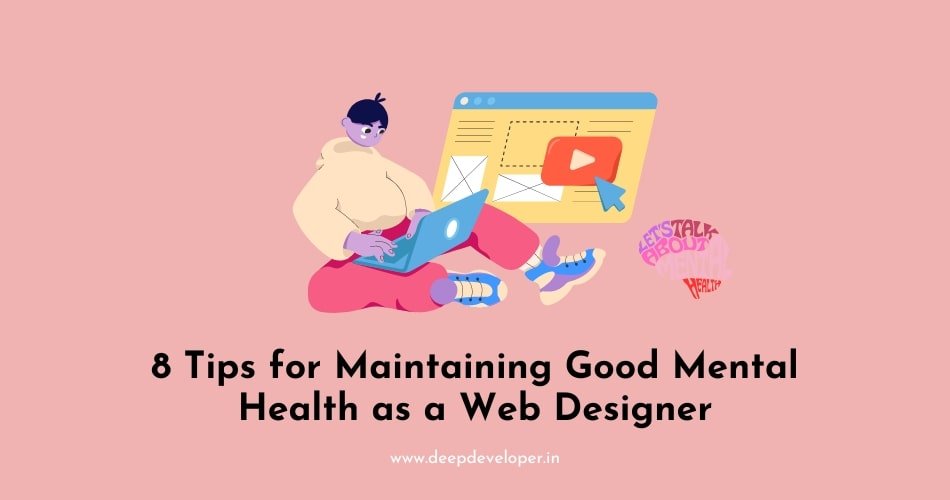As a web designer, your creativity and technical skills are in constant demand. However, the pressure to meet deadlines, handle client demands, and stay updated with ever-changing design trends can take a toll on your mental health. It’s crucial to prioritize your well-being to ensure you can thrive in your profession. Here are eight essential tips for maintaining good mental health as a web designer.
Keep Good Mental Health as a Web Designer: Simple Tips
#1 Start Planning Your Day
Proper time management is crucial for maintaining good mental health as a web designer. Start your day by planning your tasks and setting clear goals for what you want to achieve. Create a to-do list, prioritize your tasks, and break them down into smaller, manageable steps. This will help you stay organized, focused, and reduce the feeling of being overwhelmed.
One of the key aspects of maintaining good mental health as a web designer is effective time management, and it all starts with planning your day.
Here are some tips on how to plan your day for optimal productivity and well-being:
- Set Clear Goals: Take a few minutes to review your tasks and prioritize them based on their urgency and importance.
- Create a To-Do List: Write down all the tasks that need to be completed and organize them in a logical order. You can use a digital task management tool or simply jot them down on paper.
- Break Tasks into Smaller Steps: Large tasks can feel overwhelming, which can negatively impact your mental well-being. To tackle them effectively, break them down into smaller, manageable steps.
- Set Realistic Deadlines: It’s important to set realistic deadlines for your tasks to avoid unnecessary stress.
- Plan for Flexibility: Web design projects can often be unpredictable, with unexpected changes and last-minute client requests. Plan for flexibility in your day by allocating some buffer time for unexpected tasks or delays.
- Prioritize Self-Care: In the midst of a busy workday, it’s crucial to prioritize self-care. Make sure to schedule time for breaks, meals, exercise, and relaxation.
- Avoid Multitasking: While it may be tempting to try to do multiple tasks at once, multitasking can actually decrease productivity and increase stress.
- Review Your Progress: At the end of the day, take some time to review your progress.
#2 Don’t Leave Tasks for Later
Procrastination can increase stress and anxiety. Avoid leaving tasks for later, as it can lead to a backlog of work and added pressure. Instead, tackle your tasks head-on and complete them as soon as possible. This will help you stay on track and maintain a sense of accomplishment, which can boost your mental well-being.

#3 Keep Good Habits
Healthy habits contribute to good mental health. Make sure to get enough sleep, eat well, and engage in regular physical exercise. Staying hydrated and taking breaks to stretch and move around can also help you stay focused and energized throughout the day. Prioritizing self-care will enhance your mental resilience and ability to cope with stress.
#4 Don’t Waste Time on Bad Clients
Dealing with difficult clients can be stressful and draining. It’s essential to establish healthy boundaries and not waste time on clients who are not respectful or appreciative of your work. Set clear expectations from the beginning, communicate openly and professionally, and learn to say no when necessary. Surround yourself with clients who value your expertise and respect your boundaries, as this can greatly impact your mental well-being.

#5 Take Breaks Throughout the Day
Sitting for long hours in front of a computer screen can lead to physical strain and mental fatigue. It’s crucial to take regular breaks throughout your workday. Step away from your desk, stretch, go for a short walk, or engage in activities that help you relax and rejuvenate. Taking breaks can improve your productivity, creativity, and overall mental health.
#6 Avoid Imposter Syndrome
Imposter syndrome, the feeling of not being good enough or capable of your work, is common among web designers and other creative professionals. Remember that it’s normal to have self-doubt from time to time, but it’s important not to let it define your worth as a designer. Recognize your achievements, acknowledge your skills and expertise, and learn to embrace constructive feedback. Surround yourself with supportive colleagues, mentors, and friends who can help you combat imposter syndrome and boost your confidence.
#7 Ignore the Competition
In the competitive world of web design, it’s easy to fall into the trap of constantly comparing yourself to others. However, this can lead to self-doubt, envy, and anxiety. Remember that every designer has their unique strengths and weaknesses. Focus on your own progress, growth, and creative expression instead of constantly comparing yourself to others. Embrace your individuality and learn from your peers without letting comparison negatively impact your mental health.
#8 Connect with Other Designers
Web design can be a solitary profession, but it’s important to connect with other designers and build a supportive community around you. Attend design conferences, join online forums or communities, participate in networking events, and engage in conversations with fellow designers. Sharing ideas, challenges, and experiences can help you gain new perspectives, learn from others, and reduce feelings of isolation. Building a supportive network of like-minded individuals can also provide a source of motivation, inspiration, and encouragement, which can greatly contribute to your mental well-being.
Also Read:
Final Words
Maintaining good mental health as a web designer requires intentional effort and self-care. By setting realistic goals, managing your time effectively, prioritizing self-care, avoiding toxic clients, taking regular breaks, combating imposter syndrome, ignoring unhealthy competition, and connecting with fellow designers, you can create a healthy work-life balance and thrive in your profession.
Remember, your mental health is just as important as your technical skills as a web designer. Taking care of your mental well-being will not only improve your overall quality of life but also enhance your creativity, productivity, and success in your career. So prioritize your mental health, implement these tips, and enjoy a fulfilling and mentally healthy journey as a web designer.

